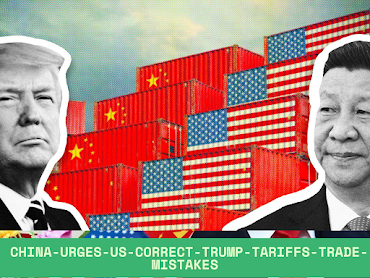.png)
Beijing, China – The Chinese government has issued a sharp statement demanding that the United States reverse tariffs imposed during the Trump administration, calling them "mistaken policies" that continue to damage both countries' economies.
The renewed demand comes as U.S. trade officials are reviewing the economic impact of these tariffs and their role in current inflation and supply chain pressures.
Background: What Are the Trump-Era Tariffs?
In 2018, then-President Donald Trump introduced sweeping tariffs on hundreds of billions of dollars worth of Chinese goods. This was part of a strategy to address what the U.S. labeled as unfair trade practices, including:
-
Intellectual property theft
-
Forced technology transfers
-
Trade imbalances
China retaliated with its own tariffs on U.S. exports, igniting a full-blown US-China trade war.
China’s Latest Statement
In a recent press briefing, a spokesperson from China’s Ministry of Commerce said:
“We urge the United States to face up to the reality, correct its mistaken practices, and work with China to bring bilateral economic relations back on the right track.”
Beijing claims that the continuation of these tariffs violates World Trade Organization (WTO) rules and places unnecessary strain on global trade flows.
Washington’s Position
So far, the Biden administration has maintained most of the Trump-era tariffs, despite pressure from industry groups and economists urging a rollback to ease inflation and boost consumer spending.
US Trade Representative Katherine Tai has stated that tariffs remain a tool for “strategic leverage” and will only be reviewed in the context of broader economic and national security goals.
Economic Impact on the USA
The tariffs continue to impact:
-
Prices of consumer goods (especially electronics, furniture, and clothing)
-
American farmers who’ve lost major export markets
-
US manufacturers relying on Chinese parts
Several US businesses and trade associations have filed requests for exemptions, citing increased costs and supply chain disruptions.
Global Reaction
The World Trade Organization previously ruled that some US tariffs violated international trade rules. However, enforcement remains limited due to geopolitical complexities.
European Union leaders are watching closely, as many global economies rely on stable US-China trade relations to avoid further supply chain shocks.
What’s Next?
-
Trade Review Underway: The Office of the U.S. Trade Representative (USTR) is currently reviewing tariffs, with a final report expected later this year.
-
Potential Negotiations: Analysts expect China may propose mutual tariff reductions as part of any future trade talks.
-
Political Implications: With the 2024 US presidential elections approaching, trade policy will remain a hot-button issue for voters and candidates alike.
Expert Opinions
“Rolling back some tariffs could lower inflation and ease consumer costs, but doing so risks appearing soft on China.”
— Rachel Kim, Senior Fellow, US-China Policy Institute
“China’s rhetoric is intensifying because they see an opportunity to push for economic relief without making significant concessions.”
— James Lin, Global Trade Analyst
Conclusion
As China presses for an end to Trump-era tariffs, the United States faces a critical choice: maintain its current leverage in trade negotiations or adjust policies to ease domestic economic strain. Either decision will have significant consequences for the global economy, diplomatic relations, and the 2024 election landscape.
Stay tuned for updates as this developing story unfolds.
Hashtags:
#TrumpTariffs #ChinaUSTrade #BreakingNews #USPolitics #GlobalEconomy #TradeWar #WorldNews #ChinaNews #TradePolicy #Election2024 #TariffReview #BidenAdministration #InflationCrisis #SupplyChain


.png)

.png)
.png)



.jpg)


0 Comments